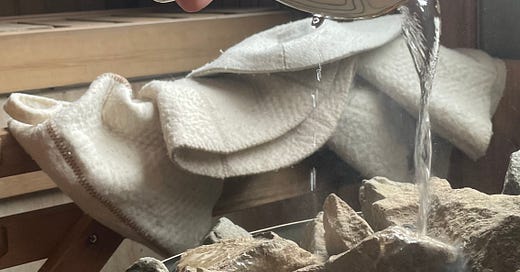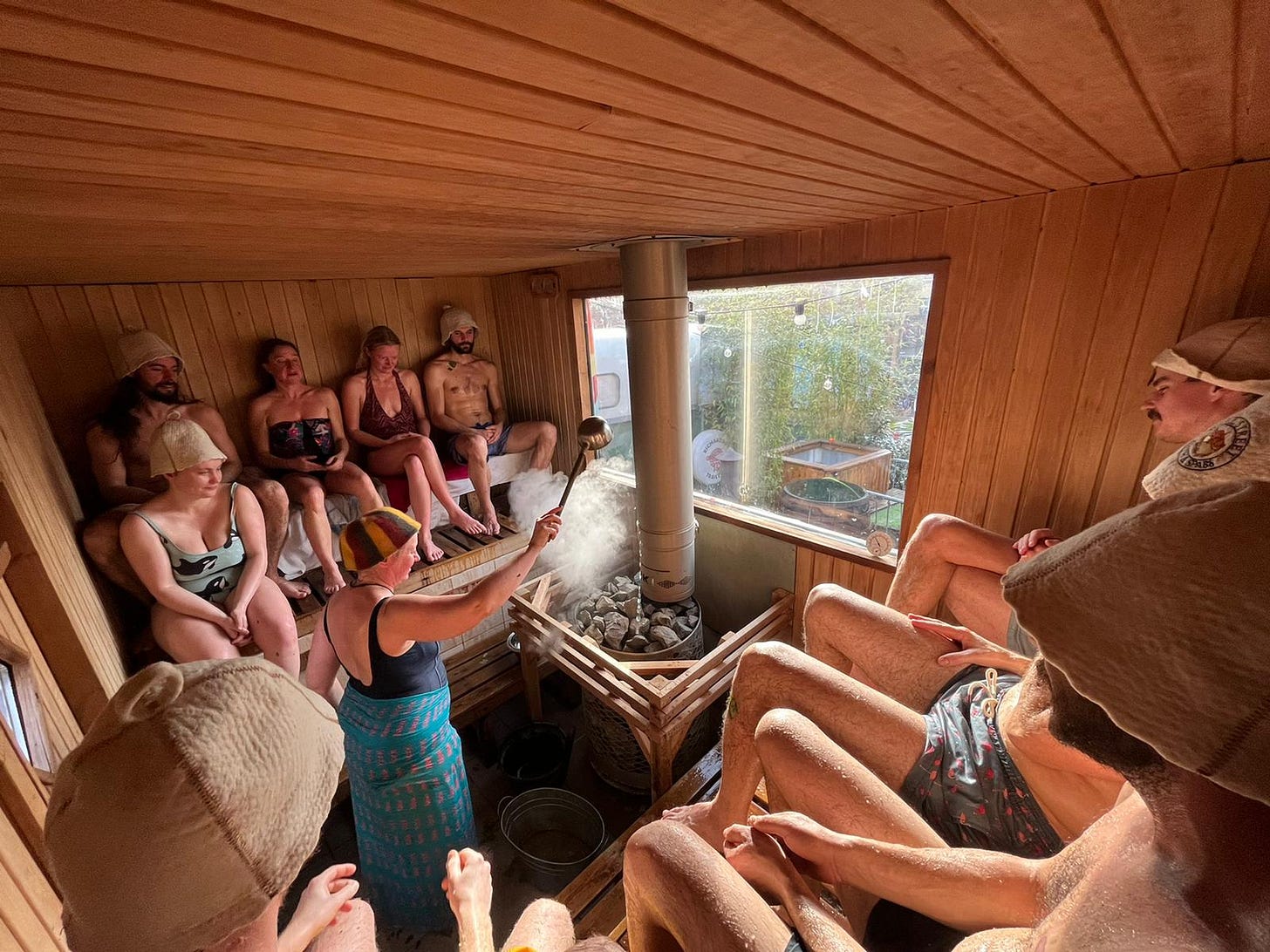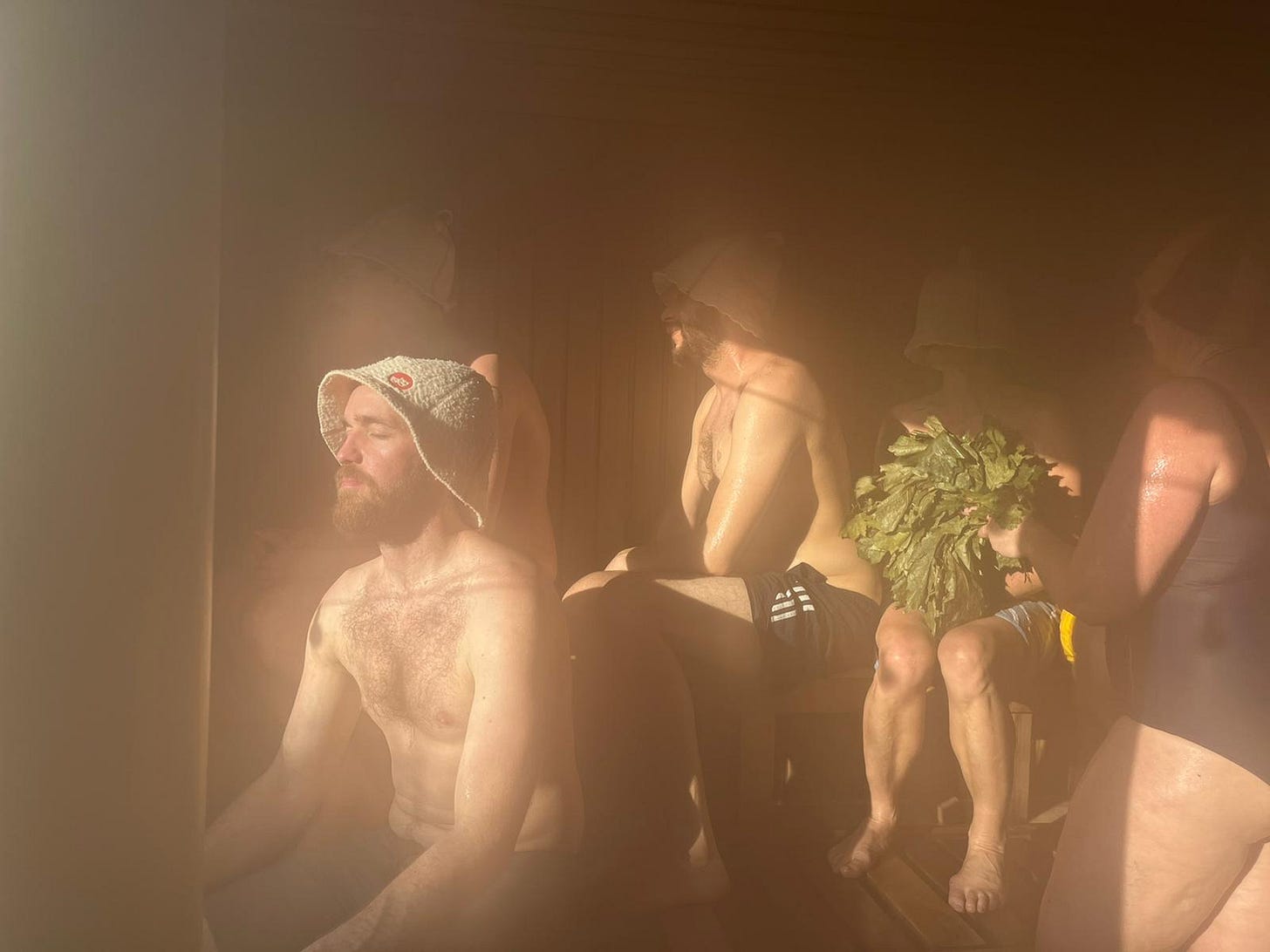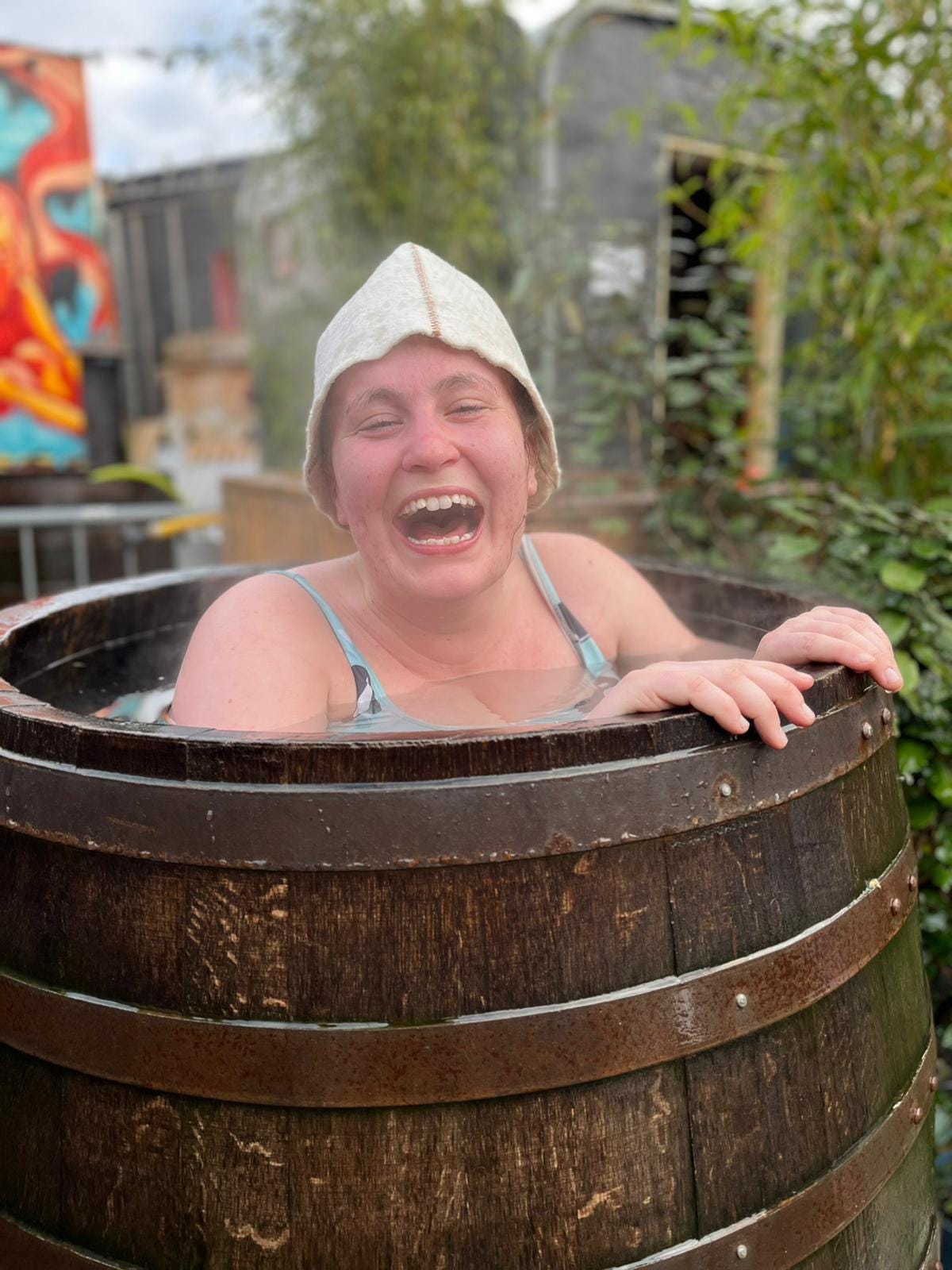Junkyard sauna
The sauna catapults you inside your body, reminding you that you are flesh and bone as well as thought and worry.
I have a terrible habit of holding my breath while I’m concentrating. Every so often I let all the air out in a big sigh, like I’m suffering a deep disappointment. It’s like I have to leave my body to access the efficient headquarters of my brain, but in the process, I forget how to do something I was born knowing – breathing.
There’s lots of things that make me feel divorced from my body. If I’m anxious about something, I am more a stream of consciousness than a physical being. I regularly get bloating and abdominal pain, and I’ll lock myself in my head to numb the sensation. When I’ve had a big shock, I harden like glass and shatter, some of me cowered inside my body while other parts hide on the ceiling and observe.
“I used to see a lot of people in hospital when I worked in A&E who are completely disembodied,” says Nicola Stoke, an anaesthetist and intensive care doctor. “People come in with chest pain where we can’t find a cardiac cause, and they find it quite hard to believe or process that it might actually be trauma or stress manifesting in the body.” Stoke is also a breathwork instructor who built a sauna out of her shed. “You’re so embodied in the sauna because it’s such an extreme feeling, it’s the only thing you can think of,” she says. “It can be like meditation, but you can also get a lot of emotional release by just getting into your body and feeling what that’s like.”
The heat of the sauna catapults you inside your body, reminding you that you are flesh and bone as well as thought and worry. As a ladle of water steams the rocks, I’ve never been so aware of my ears; when the heat reaches them, their translucent skin momentarily burns. It’s hard to tickle yourself, but my own sweat tickles me as it slides down my chest, gathering in the hairs around my belly button and making them curl. My skin is slick as a frog and I can faintly hear the churn of a cement grinder in the background.
The sauna I’m in is made from an old horsebox, wedged in a grassy plot between some artist studios and the A12 motorway. “Saunas have been getting really popular in the UK, but most of the new businesses are by the sea or a lake, and it will be a treat at a higher price point,” Charlie Duckworth, director of Hackney Wick Community Sauna, says. “We just want to provide as much sauna as possible in the city at an affordable price.” Britain is behind most of Europe when it comes to bathhouse culture, though the British Sauna Society is keen to point out that we’ve had saunas since the stone age. In London we’ve benefitted from Russian banyas, Turkish hammams, and the Finnish Church’s basement sauna. Hackney Wick Community Sauna has a lower price point — £10 on weekdays, £15 on weekends, with free or discounted memberships for students, pensioners, carers, NHS workers or people on universal credit — and offers the grimy charm of being at a festival.
Sitting in a sauna isn’t always pleasurable. It is uncomfortable when the heat climbs up your body like dragon’s breath, and the air in your lungs is so warm it doesn’t quench you. There’s stoicism in planting your limbs down to survive the heat a minute longer, your sweat leaving a shadow of your body on the bench. It makes you treasure fresh air when it hits you, makes you see cold water as a gift. The true pleasure of it comes after, once you have bounced between extremes and relaxed into the feeling of balance. Your mind is wiped clean and so planted in the present moment you’re likely to float out of the sauna forgetting your towel or your crocs. Your limbs buzz with lightness while your bones are heavy, primed for a deep night’s sleep.
Being inside your body isn’t always pleasurable either, particularly if you’re living with stress, trauma, dysphoria or chronic pain. “To arrive in our bodies and feel more alive is one of the most sacred experiences we can have as human beings,” sex and relationship coach Dawn Serra says in an interview for The Care We Dream Of: Liberatory and Transformative Approaches to LGBTQ+ Health. The more we inhabit our bodies the more we see them as deserving of care and delight – but getting in touch them also means feeling the pain and tension trapped within. “We’re also opening ourselves up to deep grief, to deeper sadness, and to feeling more deeply in all areas of life,” Serra says. There is no light without shade, no sweltering heat without bracing cold. There is a lesson in the sauna, of withstanding discomfort to reach pleasure, and staying present for the entire journey.
The World Transformed (TWT), a utopian political education project, traces the history of bathhouse culture from Roman baths where the rich and the poor would sweat it out together to the sanatoriums of soviet Russia which enshrined the constitutional right to rest. Though research into the medical benefits of saunas is limited, studies have shown that going multiple times a week can improve cardiovascular health, reduce symptoms of depression and decrease the risk of Alzheimer's and dementia. But nowadays, saunas are often encased in fancy gyms or exclusive spas. “We call for something of a national spa service with a sauna in every community providing a space of healing and togetherness away from the demands of work,” says TWT host Sarah Vowden, urging a return to the sauna’s democratic roots.
Looking to make this dream a reality, the Community Sauna team are hoping to open two more sites in London and to assist with opening saunas in Bristol and Glasgow. They are also keen to make saunas part of the NHS’ social prescribing measures – when doctors, nurses and other health and care professionals refer people to non-clinical services, such as community groups or financial advisors, to alleviate social determinants of poor health such as loneliness and poverty. “Our users report things like curing depression, or making friends for the first time in London,” Duckworth says. “It’s almost tear-jerking reading these things.”
Saunas have long been a space for covert gay sex, though their popularity has waned with the advent of hookup apps and the decriminalisation of homosexuality in the western world. “It’s quite unusual to have specific queer spaces that aren’t sexual,” Stoke says, explaining why she’s planning a queer night at Hackney Wick Community Sauna. “Unlike nightclubs or gay saunas, a queer sauna is a space where you can connect with people who share similar experiences without sex, drugs or alcohol.” Whether you’re in a specifically queer sauna or not, TWT points out that “with its emphasis on physical equality, mutual self care, and letting go together, there is something about bathhouse culture that troubles rigid notions of masculinity.”
When I emerge from the sauna into the night air I am an angelic being, circled by a halo of steam. In Native American sweat lodges and Mexican temazcales, heat is used in rituals which provide spiritual as well as physical healing, with the dark, warm space symbolising the womb of the Earth. Even without a facilitated spiritual practice, Stoke says that in the sauna “you share an element of ritual which is often lost in modern society.”
I baptise myself in an old whiskey barrel filled with icy water, watching others lower themselves into neighbouring barrels like stowaways. I haul myself out to complete the cycle of tension and release. I hear traffic and see the moon. “[Ritual] is a reminder that every aspect of our lives is and can be holy,” Blyth Barnow writes in Ritualising Queer Care. “That we are holy, in the ordinariness of our lives.”
Words by our editor Helen Gonzalez Brown (@helenbr0wn), Pictures: Hani Dresner and Hackney Wick Community Sauna.
Come down to Hackney Old Baths for an Easter Monday full of dancing, saunas and queer magic from 6-10pm on Monday 10th April. We will be there selling our wares and there will also be a clothes exchange if you want to pick up some treats! Say hello and sweat out your worries with us, we can’t wait to see you.







